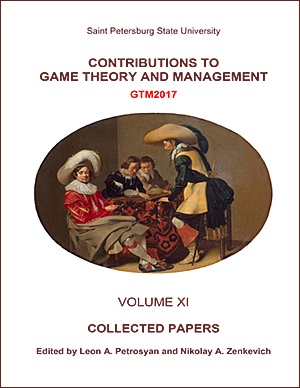Competitive and Cooperative Behavior in Distribution Networks
Abstract
This paper considers the problem of cooperation in supply networks. The model is based on distribution network, which includes several manufactures, single distributor and multi retailers, operated and competed in consumer markets that are functioning according to the Cournot model with the linear demand. All participants in a chain are trying to maximize their profit. A multi-stage hierarchic game was carried out. At the first step, we construct the competitive solution for such supply network as the perfect Nash equilibrium in the multi-step hierarchical game in the closed form. At the second step, we construct the cooperative solution for the network, where winnings of all participants in the found perfect Nash equilibrium are considered as the status quo point. Cooperative decision we calculate in the form of the weighted Nash bargaining solution, which comes down to the solution of a separable nonlinear programming problem. Numerical example for the network shows that cooperative decision is more profitable than competitive decision for all participants.
Keywords:
distribution network, competitive and cooperative decisions, multi-stage hierarchical game, perfect Nash equilibrium, weighted Nash bargaining solution
Downloads
References
Downloads
Published
How to Cite
Issue
Section
License
Articles of "Contributions to Game Theory and Management" are open access distributed under the terms of the License Agreement with Saint Petersburg State University, which permits to the authors unrestricted distribution and self-archiving free of charge.




